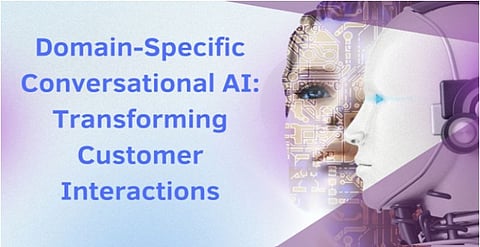

Artificial intelligence is revolutionizing customer service, and domain-specific conversational agents are at the forefront of this transformation. These intelligent systems are designed to address industry-specific challenges, offering precise, efficient, and personalized interactions. Swapnil Hemant Thorat, an expert inc AI-driven customer service technologies, explores how these innovations are reshaping the landscape of customer support.
Early chatbots relied on predefined scripts and decision trees, often leading to frustrating customer experiences due to their rigid and limited understanding. Traditional models could only handle a handful of predefined intents, making them ineffective for dynamic conversations. Domain-specific conversational agents, however, leverage fine-tuned Large Language Models (LLMs) that understand industry-specific terminology and workflows, significantly improving response accuracy and customer satisfaction.
One of the major breakthroughs in domain-specific AI is its ability to accurately interpret specialized terminology. Unlike generic chatbots, which often misinterpret industry jargon, these advanced systems achieve over 90% accuracy in recognizing domain-specific terms. This ensures that customer queries are addressed with precision, whether they relate to financial services, healthcare, or technical support.
This precision stems from extensive training on industry-specific corpora and contextual understanding frameworks. Domain experts collaborate with AI developers to create comprehensive knowledge bases that capture nuanced meanings of specialized vocabulary.
Generic AI models struggle to maintain context over multiple interactions, often requiring users to repeat information. Domain-specific agents, however, incorporate sophisticated memory architectures that track contextual variables across conversations. This capability allows them to retain and recall relevant details, reducing conversation length by nearly half while improving first-contact resolution rates.
A key advantage of domain-specific conversational AI is its deep integration with business workflows. These agents are designed to navigate complex multi-step processes, such as loan applications, claims processing, or troubleshooting procedures, with remarkable efficiency. By integrating with backend systems, they provide real-time updates and automate routine tasks, reducing operational costs and enhancing service consistency.
Modern AI-powered assistants utilize customer data platforms to provide highly personalized interactions. These systems analyze customer history, preferences, and previous interactions to tailor responses, improving engagement and customer satisfaction. Advanced implementations integrate with multiple data sources, allowing businesses to offer contextual recommendations that are both relevant and timely.
Maintaining conversation continuity is crucial for effective customer interactions. Domain-specific conversational agents track multiple state variables to ensure that interactions remain fluid and coherent. By leveraging sophisticated attention mechanisms, they process complex scenarios involving multiple topics, reducing errors and ensuring a seamless user experience.
Despite their advancements, AI-driven agents recognize their limitations. When a conversation surpasses their confidence threshold, they seamlessly transfer the interaction to a human representative. Unlike traditional escalation methods, these systems package the conversation history and relevant context, ensuring that human agents can pick up where the AI left off. This results in a smoother transition and improved customer satisfaction.
Scalability is a critical factor in deploying AI-powered customer service solutions. Organizations require infrastructure that can handle high query volumes without compromising performance. By adopting cloud-based microservices architectures, domain-specific agents can dynamically scale to meet demand fluctuations while maintaining response speeds under half a second.
Security is equally paramount. These AI systems implement robust data privacy measures, including encryption, access controls, and compliance with industry regulations. As businesses increasingly rely on AI for customer interactions, ensuring secure and compliant implementations becomes essential.
The next wave of innovations in domain-specific AI is already taking shape. Emerging trends include multimodal interactions, where AI integrates text, voice, and visual elements for more intuitive communication. Additionally, proactive AI systems will anticipate customer needs, initiating conversations before an issue arises. Enhanced emotional intelligence will also enable AI to adjust responses based on sentiment analysis, further humanizing interactions.
Continuous learning mechanisms are another key development. AI agents will become more adaptive, refining their knowledge with each interaction. These advancements will drive further automation of routine queries while ensuring human agents focus on complex, high-value interactions.
In conclusion,domain-specific conversational agents are redefining customer service by combining AI efficiency with deep industry expertise. Organizations that leverage these systems benefit from reduced wait times, improved accuracy, and enhanced personalization. As AI technology continues to evolve, businesses must embrace these intelligent systems to stay competitive. Swapnil Hemant Thorat emphasizes that the future of customer service lies in balancing AI-driven automation with human insight, ensuring that customers receive the best possible experience.
